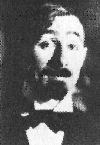Moses Schönfinkel
| Moses Ilyich Schönfinkel | |
|---|---|
| Born |
1887 or 1889 Ekaterinoslav, Russian Empire |
| Died |
1942 Moscow, Soviet Union |
| Citizenship | Russian |
| Nationality | Russian |
| Fields | Mathematics |
| Institutions | University of Göttingen |
| Known for | Combinatory logic |
Moses Ilyich Schönfinkel, also known as Moisei Isai'evich Sheinfinkel' (Шейнфинкель) (4 September 1889 Ekaterinoslav (now Dnipropetrovsk, Ukraine) – 1942, Moscow), was a Russian logician and mathematician, known for the invention of combinatory logic.
Life

Schönfinkel attended the Novorossiysk University of Odessa, studying mathematics under Samuil Osipovich Shatunovskii (1859–1929), who worked in geometry and the foundations of mathematics. From 1914 to 1924, Schönfinkel was a member of David Hilbert's group at the University of Göttingen.[1] On 7 December 1920 he delivered a talk to the group where he outlined the concept of combinatory logic. Heinrich Behmann, a member of Hilbert's group, later revised the text and published it in 1924.[2] In 1929, Schönfinkel had one other paper published, on special cases of the decision problem ("Entscheidungsproblem"), that was prepared by Paul Bernays.[3]
After he left Göttingen, Schönfinkel returned to Moscow. By 1927 he was reported to be mentally ill and in a sanatorium.[2][3] His later life was spent in poverty, and he died in Moscow some time in 1942. His papers were burned by his neighbors for heating.[3]
Work
Schönfinkel developed a formal system that avoided the use of bound variables. His system was essentially equivalent to a combinatory logic based upon the combinators B, C, I, K, and S. Schönfinkel was able to show that the system could be reduced to just K and S and outlined a proof that a version of this system had the same power as predicate logic.[2]
His paper also showed that functions of two or more arguments could be replaced by functions taking a single argument. This replacement mechanism simplifies work in both combinatory logic and lambda calculus and would later be called currying, after Haskell Curry. While Curry attributed the concept to Schönfinkel, it had already been used by Frege.[4]
Publications
- 1924. "Über die Bausteine der mathematischen Logik", Mathematische Annalen 92, pp. 305–316. Translated by Stefan Bauer-Mengelberg as "On the building blocks of mathematical logic" in Jean van Heijenoort, 1967. A Source Book in Mathematical Logic, 1879–1931. Harvard Univ. Press: 355–66.
- 1929. (with Paul Bernays) "Zum Entscheidungsproblem der mathematischen Logik," Mathematische Annalen 99: 342–72.
See also
References
- ↑ Cardone, Felice; Hindley, J. Roger, "History of Lambda-calculus and Combinatory Logic", in Gabbay, Dov M.; Woods, John, Handbook of the History of Logic 5, Elsevier
- ↑ 2.0 2.1 2.2 Curry, Haskell (November 1927), Notes on Schönfinkel, 271128A (T271128A), Curry archives.
- ↑ 3.0 3.1 3.2 Kline, G. L.; Anovskaa, S. A. (1951), "Review of Foundations of mathematics and mathematical logic by S. A. Yanovskaya", Journal of Symbolic Logic 16 (1): 46–48, doi:10.2307/2268665, JSTOR 2268665
- ↑ Quine, introduction to Bausteine der mathematischen Logik", pp. 305–316. Translated by Stefan Bauer-Mengelberg as "On the building blocks of mathematical logic" in Jean van Heijenoort, 1967. A Source Book in Mathematical Logic, 1879–1931. Harvard Univ. Press: 355–66.